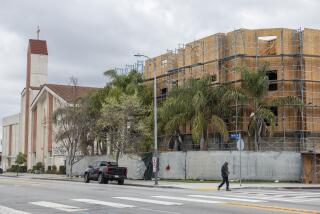Rules make some titleholders more equal than others
- Share via
Question: I’ve been looking to buy a condo but am hesitant because of all the problems that owners I talk to tell me they’ve experienced. My concern is that after I buy a condo, I’ll be unable to protect my single most expensive asset, my home, to the fullest extent. A relative who owns a condo and is a longtime board member at his homeowners association told me that my hesitation is unwarranted. He says owners have the same rights as board members. Is he correct?
Answer: California statutes and case law tie the hands of residential deed-restricted titleholders in many ways, which not only affect your ability to protect your home, but also affect your quality of life.
An example of this occurred Oct. 14, 2007, when Assembly Bill 980 was signed into law mandating disclosures on real property-related “transfer fees.” While that may sound good, AB980 exempted homeowners associations from those disclosures. That means deed-restricted property owners have no control over the fees charged and don’t have a right to know how much they will have to pay or for what purpose they will be paying any association-related entities in advance of or during the sale of their separate interest.
The Davis-Stirling Act became law in 1985 and has been amended many times. It is meant to provide protections for titleholders but lacks the teeth for any realistic enforcement. For deed-restricted titleholders who are not board directors, the California Civil Code makes individual asset protections difficult, rendering an owner’s rights inferior to any sitting board director’s.
For example, the California Corporations Code gives an association member the right to inspect the books and records of the association “at any reasonable time, for a purpose reasonably related to such person’s interests as a member.” By comparison, the code gives a director “the absolute right at any reasonable time to inspect and copy all books, records and documents of every kind and to inspect the physical properties of the corporation of which such person is a director.” The nonboard director’s unfettered access to association records is further curtailed by the state civil code. It definitely appears that the rights of some titleholders in common-interest developments are more equal than the rights of others.
The state’s Business and Professions Code cautions the public about buying into a common interest or deed-restricted community: A buyer that is “the purchaser of an interest in a common-interest development should contemplate active participation in the affairs of the association. He or she should be willing to serve on the board of directors or on committees created by the board. In short, ‘they’ in a common interest development is ‘you.’ Unless you serve as a member of the governing board or on a committee appointed by the board, your control of the operation of the common areas and facilities is limited to your vote as a member of the association.
There are actions that can be taken by the governing body without a vote of the members of the association which can have a significant impact upon the quality of life for association members.”
Also of note: If deed-restricted owners have to sue to prove their homeowner association board violated the law or the governing documents, they are burdened with paying their own attorney’s fees, while the board’s costs are paid by the owners and/or the association’s insurance policies.
--
Send questions to P.O. Box 11843, Marina del Rey, CA 90295 or noexit@mindspring.com.
More to Read
Inside the business of entertainment
The Wide Shot brings you news, analysis and insights on everything from streaming wars to production — and what it all means for the future.
You may occasionally receive promotional content from the Los Angeles Times.










